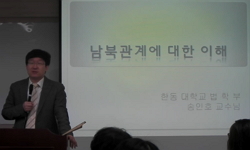Already in the 1980s most leftist politicians as well as critical intellectuals in West Germany shut the door on the idea of a German reunification based on the mobilization of people through nationalist sentiments and a national identity. They claime...
http://chineseinput.net/에서 pinyin(병음)방식으로 중국어를 변환할 수 있습니다.
변환된 중국어를 복사하여 사용하시면 됩니다.
- 中文 을 입력하시려면 zhongwen을 입력하시고 space를누르시면됩니다.
- 北京 을 입력하시려면 beijing을 입력하시고 space를 누르시면 됩니다.

1989/90년 독일통일 과정 시 서독 좌파의 비판과 대안들 = Criticisms and Alternatives from the Left during the Unification in 1989/1990
한글로보기https://www.riss.kr/link?id=A82502023
- 저자
- 발행기관
- 학술지명
- 권호사항
-
발행연도
2010
-
작성언어
Korean
-
주제어
국가연합 ; 독일통일 ; 사민당 ; 녹색당 ; 서독 좌파 ; 귄터 그라스 ; Confederation ; German Unification ; SPD ; Green Party ; West German Left ; G?nter Grass
-
KDC
920
-
등재정보
KCI등재
-
자료형태
학술저널
-
수록면
155-186(32쪽)
- 제공처
- 소장기관
-
0
상세조회 -
0
다운로드
부가정보
다국어 초록 (Multilingual Abstract)
The West German leftists obviously were not able to accurately gauge contemporary conditions, specially the strong will of the East German people for the national unification, and they could not respond changes of the international and German constellations flexibly or practically. Buried on their own idea that the concept of a unified Europe and the overcoming of the German division must develop and grow together via a German confederation, they stubbornly held on the idea even when the two did not move forward with the same force or at the same pace. The SPD und the Green Party as well as critical intellectuals were unable to put forth practical suggestions and countermeasures at the right times.
When we look at Germany today, 20 years since its reunification and choose to focus on the problems of unification through absorption, it is important to recall the warning the West German leftists continuously have emphasized, which was that the “Goliath West Germany” should not lopsidedly ‘tutor’ “David East Germany.” The critism and alternatives from the West-German Left during the unification in 1989/90 would be taken count of as important historical experiences for the reflection on a more democratic process and form of the national unification.
Already in the 1980s most leftist politicians as well as critical intellectuals in West Germany shut the door on the idea of a German reunification based on the mobilization of people through nationalist sentiments and a national identity. They claimed fervently that with the looming idea of a unified Europe or a common European security system, the German Problem must be solved within these supra-national prospects in mind. These ideas had a significant influence on the plans and politics that West German political leaders carried out in the process of German Unification in 1989/1990.
The West German leftists obviously were not able to accurately gauge contemporary conditions, specially the strong will of the East German people for the national unification, and they could not respond changes of the international and German constellations flexibly or practically. Buried on their own idea that the concept of a unified Europe and the overcoming of the German division must develop and grow together via a German confederation, they stubbornly held on the idea even when the two did not move forward with the same force or at the same pace. The SPD und the Green Party as well as critical intellectuals were unable to put forth practical suggestions and countermeasures at the right times.
When we look at Germany today, 20 years since its reunification and choose to focus on the problems of unification through absorption, it is important to recall the warning the West German leftists continuously have emphasized, which was that the “Goliath West Germany” should not lopsidedly ‘tutor’ “David East Germany.” The critism and alternatives from the West-German Left during the unification in 1989/90 would be taken count of as important historical experiences for the reflection on a more democratic process and form of the national unification.
목차 (Table of Contents)
- Ⅰ. 머리말
- Ⅱ. “간단치 않은 조국”: 1980년대 서독 좌파들과 민족문제
- Ⅲ. 1989/90년 서독 좌파 야당들의 대안적 통일관
- Ⅳ. 서독 지식인들의 흡수통일 비판 - 귄터 그라스의 국가연합론을 중심으로
- Ⅴ. 맺음말
- Ⅰ. 머리말
- Ⅱ. “간단치 않은 조국”: 1980년대 서독 좌파들과 민족문제
- Ⅲ. 1989/90년 서독 좌파 야당들의 대안적 통일관
- Ⅳ. 서독 지식인들의 흡수통일 비판 - 귄터 그라스의 국가연합론을 중심으로
- Ⅴ. 맺음말
- Abstract
동일학술지(권/호) 다른 논문
-
- 서울대학교 서양사연구회
- 오경환(Kyunghwan Oh)
- 2010
- KCI등재
-
- 서울대학교 서양사연구회
- 이진일(Jinil Lee)
- 2010
- KCI등재
-
프랑스 종교전쟁기(1562-1598) 에티엔 파스키에를 통해서 본 ‘정치파’ 사상의 형성과 그 성격
- 서울대학교 서양사연구회
- 강석환(Suk-Hwan Kang)
- 2010
- KCI등재
-
- 서울대학교 서양사연구회
- 한정숙(Jeong-Sook Hahn)
- 2010
- KCI등재




 DBpia
DBpia




